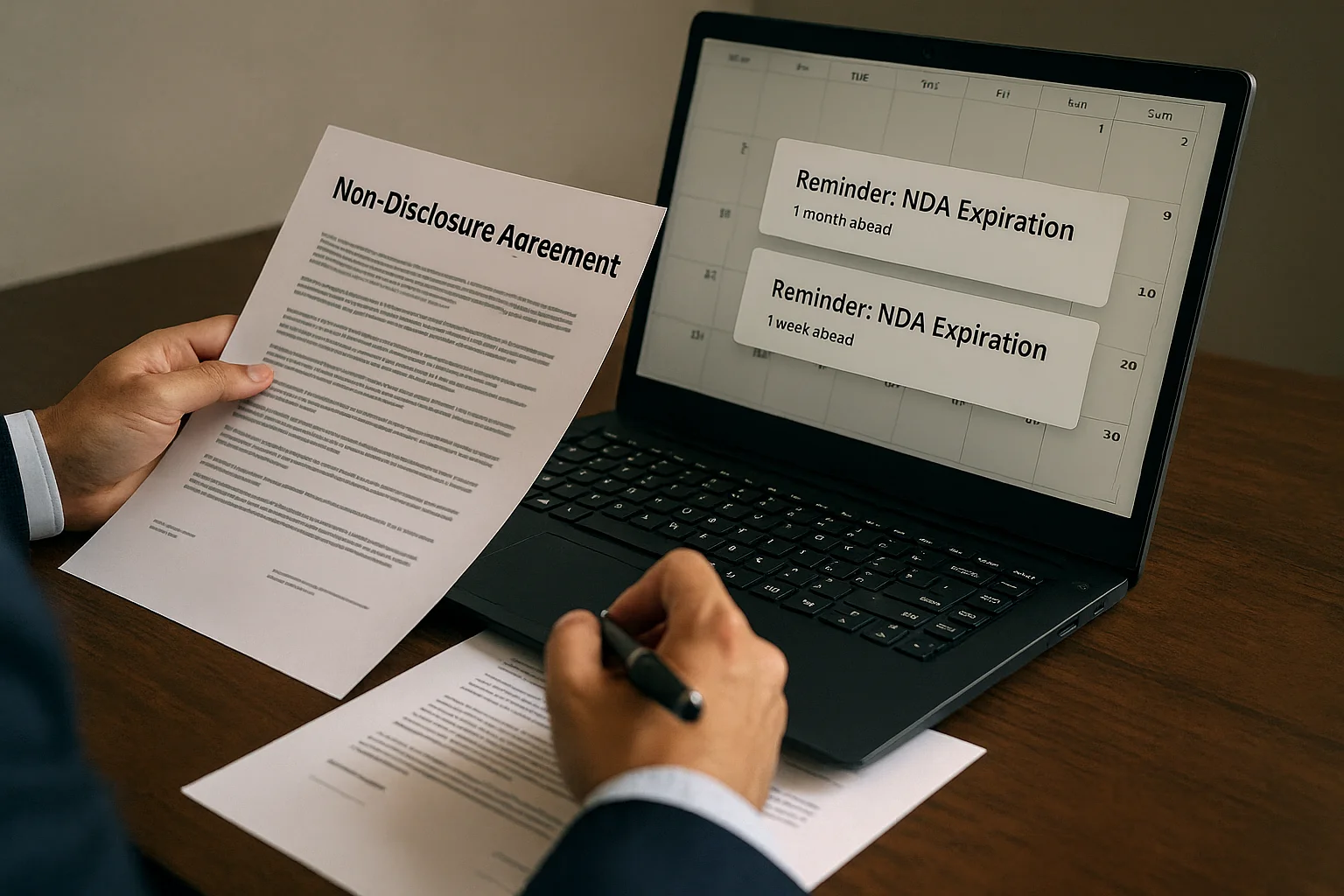Contract Management: Expiration Reminder Systems

I've been managing contracts for years, and I can tell you this: missing a contract expiration date costs more than most businesses realize. Last month, I spoke with a startup founder who lost $15,000 because their software license auto-renewed at a higher rate while they were focused on product development. They had the renewal date marked in a spreadsheet somewhere, but between team meetings and customer calls, it got lost in the daily chaos.
This happens to thousands of businesses every year. The shift from manual calendar tracking to automated expiration reminder systems isn't just about convenience—it's about protecting your bottom line and maintaining operational efficiency.
What are Expiration Reminders and Why Your Business Needs Them
An expiration reminder system is a digital notification platform designed to alert you before contracts, licenses, certifications, or any time-sensitive business documents reach their expiration date. These systems have evolved from simple calendar alerts to sophisticated platforms that can manage hundreds of contracts simultaneously.

The challenge with manual tracking becomes clear when you consider that 90% of companies struggle with effective contract expiration management. Most businesses start with spreadsheets, but as contract volumes grow, human error becomes inevitable. Traditional manual tracking of contract renewals often fails due to errors resulting in a loss of 5 to 40% of the contract's value. A missed expiry date for a critical vendor contract can shut down operations, while an overlooked auto-renewal clause can lock you into unfavorable terms for another year.
Real-world consequences from 2024 demonstrate this clearly. A manufacturing company in Ohio faced a $50,000 penalty when their environmental compliance certification expired unnoticed. A consulting firm in California automatically renewed a $30,000 software contract they no longer needed because the renewal notice was buried in email.
Expiration reminders prevent these scenarios by creating an automated system that tracks all your contract expiration dates and sends notifications well in advance. The system ensures you have enough time to evaluate each contract, negotiate better terms, or simply terminate agreements that no longer serve your business.
The Hidden Costs of Missed Contract Expirations
The numbers tell a stark story. Industry data shows $50 billion in annual losses globally from missed contract renewals, with businesses experiencing an average 9.2% contract value erosion when renewal deadlines slip by unnoticed. Organizations that adopt modern contract reminder systems see significant reductions in negotiation cycles and inaccuracies in payments, further emphasizing the importance of proactive management.
Consider this case from March 2024: A small marketing agency forgot about their enterprise software renewal date. Instead of negotiating a new contract at market rates, they were automatically locked into another year at 20% above their previous rate—a $25,000 hit to their annual budget that could have funded two additional team members.
Legal penalties compound these costs. When vendor agreements expire without proper notice, you may face breach of contract claims or emergency procurement at premium rates. A logistics company I know had to pay 300% above standard rates for temporary warehouse space when their lease expired without renewal planning.
The opportunity costs are equally significant. Missing renegotiation windows means losing leverage to secure better terms, volume discounts, or service improvements. Companies that manage contract reminders effectively report average savings of 15-25% on renewal negotiations because they approach vendors from a position of preparation rather than desperation.
Beyond direct costs, missed renewals create operational chaos. Team members spend time tracking down contracts, legal departments scramble to review expired agreements, and business operations may be interrupted while emergency replacements are sourced.
Core Benefits of Automated Expiration Reminder Systems
Automated contract reminder software eliminates the human error factor that plagues spreadsheet tracking. Instead of relying on someone to remember to check dates, the system continuously monitors all contract expiration dates and sends alerts according to your schedule.
The most effective systems provide 30-120 day advance notifications, giving you sufficient time for strategic contract planning. You can evaluate whether to renew, renegotiate, or terminate each agreement based on current business needs rather than emergency timelines.
Automatic stakeholder alerts ensure the right people across departments—legal, finance, and procurement—receive notifications relevant to their responsibilities. A software contract might alert the IT manager and finance director, while a vendor agreement notifies procurement and operations teams.
Service interruption prevention becomes critical as businesses rely on multiple vendors and subscriptions. Automated reminders ensure you never lose access to essential services because of an overlooked renewal date. This operational continuity saves money and prevents the productivity losses that come with service gaps.
Cost savings through timely contract renegotiations often exceed the software investment within the first quarter. When you approach renewals proactively, you can benchmark competitors, negotiate volume discounts, and leverage market changes to secure better terms.
Essential Features of Modern Contract Reminder Software
Modern contract management platforms leverage AI-powered contract scanning to automatically extract key dates from PDFs and scanned documents. This eliminates the manual data entry that creates bottlenecks when migrating from spreadsheets to digital systems.
Customizable reminder schedules allow you to set multiple alerts—typically at 90, 60, 30, and 15-day intervals before expiration. Different contract types may require different notice periods, and the system adapts to your business requirements rather than forcing you into rigid templates.

Multi-channel notifications ensure alerts reach team members through their preferred communication methods: email reminders, SMS texts, Slack integrations, and mobile push notifications. This redundancy prevents important dates from getting lost in crowded inboxes.
A centralized contract repository provides secure cloud storage with access controls, making it easy to store contracts and retrieve them when needed. Instead of hunting through file cabinets or email attachments, every contract and its associated data lives in one searchable location. Many organizations house contract data in an average of 24 different systems, complicating effective management of renewals and expirations, which makes centralized storage solutions even more critical.
Integration capabilities with CRM, accounting, and procurement systems create workflow automation that extends beyond simple reminders. When a contract approaches expiration, the system can automatically create renewal tasks, alert account managers, and even trigger budget approvals. Advanced contract reminder systems embed critical decision factors like vendor performance and historical spending analysis to support renewal decisions, ensuring a more strategic approach to contract management.
Advanced Analytics and Reporting
Dashboard views provide immediate visibility into all upcoming expirations within the next six months. This high-level perspective helps with budget planning and resource allocation across departments. Smart contract management software provides organizations with the capacity to monitor every document's renewal date and owner from a single dashboard, streamlining oversight and decision-making processes.
Renewal rate tracking and contract performance metrics help identify which contracts consistently deliver value and which should be reconsidered. This data becomes particularly valuable during budget planning cycles.
Vendor spending analysis reveals patterns that inform negotiation strategies. When you can demonstrate spending history and commitment levels, vendors are more likely to offer favorable renewal terms.
Audit trails maintain compliance documentation and contract history, which becomes essential during legal reviews or regulatory audits. Every action, reminder, and renewal decision is logged and searchable.
How Artificial Intelligence Transforms Contract Management Efficiency
OCR technology revolutionizes the process of extracting key dates from scanned and legacy contracts. Instead of manually reviewing hundreds of pages to find expiry dates, AI systems can process documents in minutes and identify critical information automatically.
Natural language processing goes beyond simple date extraction to identify auto-renewal clauses, notice requirements, and termination provisions. This intelligence helps you understand not just when contracts expire, but what actions you need to take and by what deadlines.
Predictive analytics analyze historical data to suggest optimal negotiation timing and renewal likelihood. The system learns from your organization's patterns and can recommend when to start renewal conversations for the best outcomes.
Machine learning algorithms improve reminder accuracy over time by learning from your team's responses and actions. If certain types of contracts consistently require longer lead times, the system adapts its recommendation schedules.
Automated contract categorization organizes agreements by type, value, and renewal complexity, helping teams prioritize their focus on the most critical expirations.
AI-Powered Contract Intelligence
Smart contract classification automatically sorts agreements by type, value, and renewal complexity, allowing teams to focus their limited time on high-impact contracts while ensuring routine renewals don't fall through the cracks.
Vendor performance scoring based on historical contract data helps identify which suppliers consistently deliver value and which relationships need reevaluation during renewal cycles.
Market intelligence integration provides competitive renewal benchmarking, giving you data-driven insights into whether your current contract terms align with market standards.
Risk flagging identifies contracts with unfavorable terms, high penalty clauses, or unusual auto-renewal provisions that deserve special attention during the renewal process.
Implementation Best Practices for Contract Reminder Systems
Implementation Phases for Contract Reminder Systems
-
Phase 1 (Weeks 1-2): Contract Inventory Audit and Data Migration Planning Gather all existing contracts from various sources, including file cabinets, email folders, and individual team members' computers. Create a master spreadsheet with basic contract details to understand the scope of your migration project.
-
Phase 2 (Weeks 3-4): Platform Selection and Workflow Configuration Evaluate different reminder software options based on your contract volume, team size, and integration requirements. Configure notification schedules and user access permissions to align with your organization's workflow.
-
Phase 3 (Weeks 5-6): Data Import and Document Scanning Import data from existing spreadsheets and scanned documents. Utilize bulk upload capabilities and AI-powered date extraction to reduce manual data entry. Prioritize high-value and near-expiration contracts during this phase.
-
Phase 4 (Weeks 7-8): Team Training and Notification Testing Train team members on system access, contract updates, and reminder responses. Conduct tests of the notification system with upcoming renewals to ensure proper functionality across departments.
Ongoing optimization based on user feedback and renewal success metrics ensures the system continues improving. Track which reminders lead to successful negotiations and adjust timing for future similar contracts.
Measuring Success: Key Metrics for Contract Management
Renewal rate improvement should target 85-90% for strategic contracts, measuring how effectively your reminder system prevents unwanted lapses or auto-renewals. Track this metric monthly to identify patterns and optimize your notification timing.
Key metrics to track for effective contract management include:
-
Average contract processing time reduction: Aim for 50% faster processing with automation, measuring the time from receiving a renewal notice to completing negotiation and signing.
-
Cost savings from avoided auto-renewals and renegotiated terms: Document specific instances where advance notice enabled better negotiations or prevented unwanted automatic renewals.
-
Compliance score improvements and reduced audit findings: Track how often your organization misses compliance deadlines or faces penalties related to contract management.
-
Team productivity gains: Measure hours saved per month by reducing manual contract tracking and renewal management tasks.
These metrics help you demonstrate ROI to stakeholders and continuously improve your contract management process. The goal isn't just avoiding disasters—it's optimizing every aspect of how your organization manages its contractual relationships.
The shift to automated expiration reminders represents more than just operational efficiency. It's about transforming contract management from a reactive, crisis-driven process into a strategic business function that actively contributes to your organization's success.
Whether you manage a handful of key contracts or hundreds of agreements across multiple vendors, the principles remain the same: proactive management saves money, reduces risk, and creates opportunities for better business relationships. The technology exists to eliminate missed renewals and their costly consequences—the question is whether you'll implement it before or after experiencing your next expensive oversight.
Contracko: The Ideal Solution for Small Businesses and Freelancers
Contracko was specifically designed for businesses managing tens to hundreds of contracts annually—the sweet spot where manual tracking becomes unwieldy but enterprise solutions feel unnecessarily complex.
The platform offers one-click contract upload with automatic expiration date detection, eliminating the tedious data entry that often prevents small businesses from adopting contract management systems. Upload a PDF contract, and the system immediately identifies and tracks its key dates and interpret its contents.

Affordable pricing starting at $75/month for small business teams makes professional contract management accessible without the enterprise-level costs that often put these tools out of reach for growing companies.
A simple dashboard shows all contract expirations in both calendar and list views, giving you the information you need without overwhelming complexity. You can see what's expiring this month, next month, and beyond with clear, actionable details.
Why Small Businesses Choose Contracko
No complex set-up is required. Easy onboarding means you can do it yourself, or get assistance with the process. You'll have ingested 100 contracts within days, not weeks or months like some enterprise systems require.
The platform avoids enterprise bloat, making it perfect for small businesses, freelancers, and solo legal practices. You get the essential contract tracking and reminder features without paying for capabilities you'll never use.
The focus on simplicity doesn't sacrifice functionality. You still get automated reminders, secure document storage, and the peace of mind that comes with professional contract management, just without the complexity and cost of an end-to-end CLM.
For small businesses and freelancers ready to take control of their contract management, Contracko offers a practical starting point that grows with your needs. The 7-day free trial provides a risk-free opportunity to experience how automated contract reminders can transform your business operations.
Get started with Contracko
Take the hassle out of contract and subscription management. Contracko empowers you to stay organized, on time, and in control. Start simplifying today.